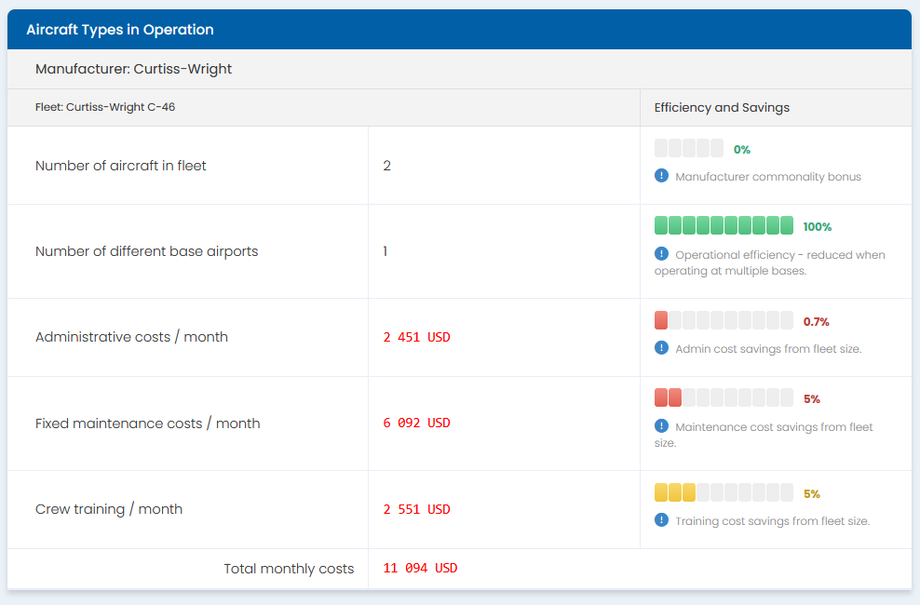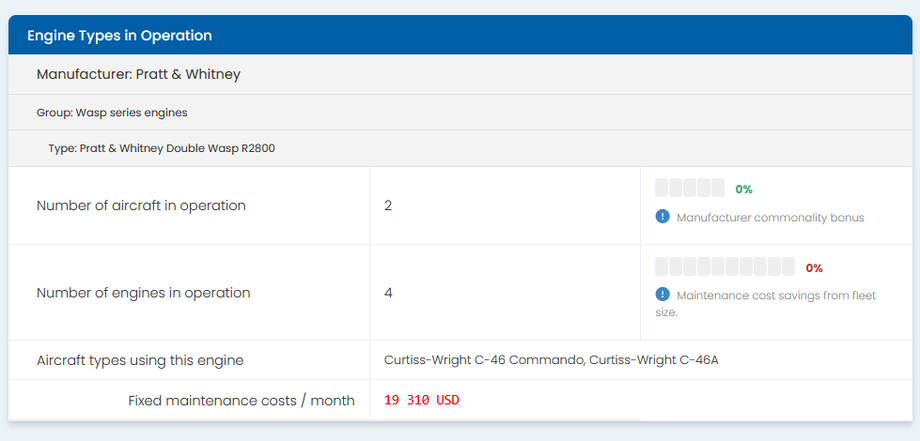For your airline to be economically viable, your aircraft fleet must be carefully selected. This means not only choosing the correct aircraft type for each route but also ensuring that your fleet is as standardized as possible to maximize Fleet Commonality benefits
Fleet Groups
In AirwaySim, aircraft are grouped into fleet groups, typically based on the manufacturer and model family. A single fleet is generally a single aircraft model or several models of the same sub-type.
The aircraft within the same fleet group share the same flight time properties, so any routes between the aircraft within the same fleet group are interchangeable without changes in the route schedule, and as such you also plan the route for the entire fleet group when opening/editing it. The fuel usage and other performance characteristics will of course then vary between the individual aircraft sub-types, of which you can read more here.
Each aircraft fleet group your airline operates costs the airline in terms of crew salaries and training. There are also fixed maintenance and administrative costs for each fleet group to model the training of the maintenance staff, availability of spare parts, maintenance infrastructure, and for other tasks like flight manuals, regulative fees and other paperwork.
How large your airline has to be before adding another fleet type into operation depends entirely on your business plan, and area of operation. Generally speaking, have at least 5 to 10 planes of the same type in operation before adding another fleet type since otherwise the fixed will eat the profits.
Aircraft Commonality Costs
You can view the details of your fleet, and the fixed costs associated with them from the Fleet Commonality page.
AirwaySim models fleet costs in a detailed and realistic way. The following categories are calculated monthly for each fleet:
-
Administration Cost
Back-office costs for managing each aircraft type, including regulatory work, documentation, and internal systems. -
Maintenance Cost
Includes tools, spare parts, hangars, and mechanic training specific to each fleet. -
Training Cost
Covers type ratings and recurrent training for both flight and cabin crew.
These costs scale with:
-
Number of aircraft in fleet
- Crew requirements and size of the aircraft type
-
Degree of fleet fragmentation
-
Similarity to existing fleet types and aircraft manufacturers
Fleet Similarity Bonuses
As your airline grows, you may want to operate multiple aircraft types, and AirwaySim rewards thoughtful fleet expansion.
Some models are closely related to each other and share common features, such as cockpit layout, avionics systems, and maintenance procedures, but for operational reasons (like different cruising speeds) they are still represented as different fleet groups in AirwaySim.
However with the Fleet Similarity Bonus it is possible to still economically operate such fleet groups together, allowing cost savings that reflect the real-world benefits of using aircraft with partially shared systems and training.
When your airline operates two or more related fleet types, AirwaySim checks for any predefined similarity links between the fleet groups. If a match is found, a bonus is applied automatically, with the following in mind:
-
Bonuses are not always symmetrical (e.g. MD-80 benefits from DC-9, but not necessarily the other way around).
-
The system compares each of your fleet types to all others and applies the best available bonus automatically (e.g. if MD-80 matches both DC-9 and another fleet, the one giving the highest discount is chosen).
-
The bonus depends on the size of both fleets in question and may not reach the full level if the fleets are small (e.g. 200 DC-9 and only 1 MD-80 will give only a minor similarity bonus to DC-9 fleet).
These bonuses are handled automatically in the background. The Fleet Commonality page will show which fleet is providing the bonus for clarity, and how much cost bonus is given.
Examples of similar fleet types:
| Fleet Group | Training Cost Bonus | Maintenance Cost Bonus |
|---|---|---|
| Airbus A320 family & Airbus A330/A340 family |
- 50 % | - 30 % |
| Boeing 737-100/-200 & Boeing 737-300/-400/-500 |
- 40 % | - 35 % |
These similarities are based on real-world shared features such as cockpit layout, avionics, systems, airframe design, or pilot cross-qualification. Note: The list above is not an exhaustive list of all similarities modelled, but just a few examples.
Manufacturer Commonality Bonus
You will also receive a manufacturer similarity bonus for utilizing aircraft from the same manufacturer as aircraft already in your fleet.
The cost reduction bonus is 2% for each fleet from the same manufacturer you already operate (capped at 10%).
This represents shared support services, training platforms, and systems standardization at the manufacturer level. While this bonus is modest, it provides an extra incentive to build your fleets around your trusted aircraft manufacturers.
New Airline Discount
Airlines with 10 or fewer active aircraft benefit from a discount on all commonality costs. This discount starts at -50% for a 1-aircraft airline and fades out as the fleet reaches 10 aircraft. This helps new and small airlines stay competitive while building their first standardized fleet.
Fleet Fragmentation Penalty
Operating too many different aircraft fleet types increases the complexity of your airline. This results in higher monthly administration, maintenance, and training costs, known as the Fleet Fragmentation Penalty.
This system models the real-world challenges of managing multiple aircraft types: more manuals, more training programs, more spare parts, and increased operational overhead.
The penalty starts small but grows rapidly the more fleet types you add. It applies to all fleet types, not just the newest one, to model the overall increase of ineffectiveness within the company.
The penalty increases non-linearly - so going from 2 to 4 fleet types is only a relatively minor increase, but jumping from 4 to 6 or more causes a sharp rise in costs.
To keep costs under control:
-
Focus on a small number of core fleet types.
-
Avoid introducing a new fleet for just 1 or 2 aircraft.
-
Monitor the Fleet Commonality page to see cost impacts clearly.
Base Airport Efficiency
In addition to fleet type fragmentation, your airline also incurs extra costs if a fleet type is operated from multiple base airports. This simulates the logistical and training overhead of managing spare parts, manuals, crew scheduling, and tooling across geographically dispersed locations.
To keep operations efficient:
-
Limit each fleet type to as few base airports as possible.
-
Assign fleet types to specific hubs where they’re needed most.
-
Avoid wide dispersal of small subfleets across your network.
Idle Fleet Types
Fleet commonality costs are not applied to fleets that are considered temporarily idle, which helps facilitate aircraft leasing and brokerage operations.
A fleet type is considered idle (and exempt from commonality costs) if both of the following conditions are met:
-
No aircraft of the fleet type are assigned to any active routes.
-
The oldest aircraft in the fleet type was delivered no more than 45 game days ago.
This grace period ensures flexibility for airlines adding or returning fleet types without incurring immediate costs.
Engine Commonality Costs
Aircraft models may come with different engine options, and for commonality purposes you should aim to unify also this selection.
This engine commonality is separate from aircraft fleet costs but is calculated in a similar way for each engine manufacturer and engine group.
Note that some engines are shared across different aircraft types, and the same commonality logic applies here. For example the CFM56 engine is used in various A320, B737, and A340 models. If your airline operates multiple aircraft with the same engine family, you benefit from reduced engine maintenance and training costs.
Fleet Commonality Calculator
To help you plan your future fleet strategy, AirwaySim includes a Fleet Commonality Calculator tool. This feature allows you to simulate how adding or removing aircraft types would affect your airline’s monthly fixed costs. You can find the calculator on the Fleet Commonality page.
The calculator helps you to estimate the commonality costs (administration, maintenance, and training) before making changes to your fleet, and is useful for stragegic planning.
Best Practices for Cost-Efficient Fleet Strategy
-
Choose a core fleet and stick to it early in the game.
-
Avoid adding a new fleet type for only a couple aircraft - wait until you can support it with at least 5 to 20 planes of the first type.
-
If expanding your fleet, look for types that share lineage with existing fleets (e.g. adding A330 to an A320 fleet). Even this partial bonus can lead to meaningful savings over time.
- Favor also aircraft types from the same manufacturer to gain additional savings.
- Unify engine choices whenever possible.
- Assign each fleet type to only the bases that truly require them.
- Use the Fleet Commonality page to monitor your current cost structure, compare savings, and make data-driven fleet decisions.




